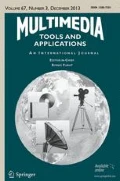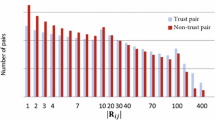Abstract
Recently, trust models have contributed much to the success of online multimedia recommendation service. However, most of them only consider the case of binary ratings and ignore the attributes of ratings, which will limit their universal applicability. To address this problem, we propose a multi-attribute rating based trust model to improve the Zhang’s Personalized trust modeling framework, an existing framework for trust modeling by using binary ratings in multi-agent electronic marketplaces. In our approach, it does not restrict users to using a single attribute rating; it allows a rating to be a certain value between 0 and 1 rather than only 0 or 1; it can improve assessment accuracy by calculating the similarity of common ratings between recommenders and users; and it considers the certainty of ratings to deal with the sudden change of partner’s behaviours. Finally, experimental results show that, our approach can effectively model the trustworthiness of recommenders and providers, and it can also resist several malicious attacks.






Similar content being viewed by others
References
Dellarocas C (2000) Immunizing online reputation reporting systems against unfair ratings and discriminatory behavior. In: Proceedings of 2nd ACM Conference on Electronic Commerce, pp 150–157
Guo G, Zhang J, Yorke-Smith N (2013) A novel bayesian similarity measure for recommender systems. In: Proceedings of the Twenty-Third international joint conference on Artificial Intelligence, AAAI Press, pp 2619–2625
Hang CW, Zhang Z, Singh MP (2012) Shin: generalized trust propagation with limited evidence. IEEE Comput 46:78–85
Huynh TD, Jennings NR, Shadbolt NR (2006) An integrated trust and reputation model for open multi-agent systems. Auton Agent Multi-Agent Syst 13(2):119–154
Jøsang A, Ismail R (2002) The beta reputation system. In: Proceedings of the 15th bled electronic commerce conference, pp 41–55
Jøsang A, Ismail R, Boyd C (2007) A survey of trust and reputation systems for online service provision. Decis Support Syst 43(2):618–644
Kamvar SD, Schlosser MT, Garcia-Molina H (2003) The EigenTrust algorithm for reputation management in p2p networks. In: Proceedings of the 12th international conference on World Wide Web, pp 640–651
Liang Z, Shi W (2005) PET: a personalized trust model with reputation and risk evaluation for P2P resource sharing. In: Proceedings of the 38th Annual Hawaii International Conference on System Sciences, pp 201b-201b
Liu S, Zhang J, Miao C et al (2012) An integrated clustering-based approach to filtering unfair multi-nominal testimonies. Comput Intell 30(2):316–341
Sabater J, Sierra C (2005) Review on computational trust and reputation models. Artif Intell Rev 24(1):33–60
Schmidt S, Steele R, Dillon TS et al (2007) Fuzzy trust evaluation and credibility development in multi-agent systems. Appl Soft Comput 7(2):492–505
Song S, Hwang K, Zhou R et al (2005) Trusted p2p transactions with fuzzy reputation aggregation. Internet Comput, IEEE 9(6):24–34
Teacy WT, Patel J, Jennings NR, et al. (2005) Coping with inaccurate reputation sources: experimental analysis of a probabilistic trust model. In: Proceedings of the fourth international joint conference on Autonomous Agents and Multiagent Systems (AAMAS), pp 997–1004
Thirunarayan K, Anantharam P, Henson C et al (2014) Comparative trust management with applications: Bayesian approaches emphasis. Futur Gener Comput Syst 31:182–199
Tian C, Yang B (2011) Trust, a reputation and risk based trust management framework for large-scale, fully decentralized overlay networks. Futur Gener Comput Syst 27(8):1135–1141
Wang Y, Hang CW, Singh MP (2011) A probabilistic approach for maintaining trust based on evidence. J Artif Intell Res (JAIR) 40(1):221–267
Wang Y, Singh MP (2007) Formal trust model for multiagent systems. In: Proceedings of the 20’th International Joint Conference on Artificial Intelligence (IJCAI), pp 1551–1556
Wang Y, Singh MP (2010) Evidence-based trust: a mathematical model geared for multiagent systems. ACM Trans Auton Adapt Syst (TAAS) 5(4):14
Whitby A, Jøsang A, Indulska J (2004) Filtering out unfair ratings in bayesian reputation systems. In: Proc. 7th Int. Workshop on Trust in Agent Societies, vol 6, pp 106–117
Xu G, Feng Z, Wu H et al (2007) Swift trust in a virtual temporary system: a model based on the Dempster-Shafer theory of belief functions. Int J Electron Commer 12(1):93–126
Zhang J, Cohen R (2006) A personalized approach to address unfair ratings in multiagent reputation systems. In: Proceedings of the AAMAS Workshop on Trust in Agent Societies
Zhang J, Cohen R (2007) Design of a mechanism for promoting honesty in e-marketplaces. In: Proceedings of the National Conference on artificial intelligence, AAAI Press, 22(2): 1495
Zhang J, Cohen R (2008) Evaluating the trustworthiness of advice about seller agents in e-marketplaces: a personalized approach. Electron Commer Res Appl 7(3):330–340
Zhang J, Cohen R (2013) A framework for trust modeling in multiagent electronic marketplaces with buying advisors to consider varying seller behavior and the limiting of seller bids. ACM Trans Intell Syst Technol (TIST) 4(2):24
Zhang J, Sensoy M, Cohen R (2008) A detailed comparison of probabilistic approaches for coping with unfair ratings in trust and reputation systems. In: Sixth Annual Conference on Privacy, Security and Trust (PST’08), IEEE, pp 189–200
Zhou R, Hwang K (2007) Powertrust: a robust and scalable reputation system for trusted peer-to-peer computing. IEEE Trans Parallel Distrib Syst 18(4):460–473
Acknowledgments
This work is supported by the National Natural Science Foundation of China under grant No. 61340039.
Author information
Authors and Affiliations
Corresponding author
Rights and permissions
About this article
Cite this article
Xu, G., Zhang, G., Xu, C. et al. A multi-attribute rating based trust model: improving the personalized trust modeling framework. Multimed Tools Appl 76, 5833–5849 (2017). https://doi.org/10.1007/s11042-015-2539-z
Received:
Revised:
Accepted:
Published:
Issue Date:
DOI: https://doi.org/10.1007/s11042-015-2539-z




